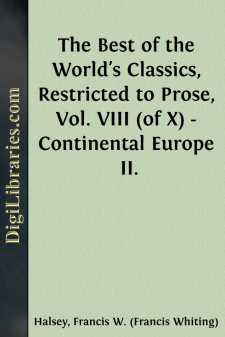Categories
- Antiques & Collectibles 13
- Architecture 36
- Art 48
- Bibles 22
- Biography & Autobiography 813
- Body, Mind & Spirit 142
- Business & Economics 28
- Children's Books 15
- Children's Fiction 12
- Computers 4
- Cooking 94
- Crafts & Hobbies 4
- Drama 346
- Education 46
- Family & Relationships 57
- Fiction 11829
- Games 19
- Gardening 17
- Health & Fitness 34
- History 1377
- House & Home 1
- Humor 147
- Juvenile Fiction 1873
- Juvenile Nonfiction 202
- Language Arts & Disciplines 88
- Law 16
- Literary Collections 686
- Literary Criticism 179
- Mathematics 13
- Medical 41
- Music 40
- Nature 179
- Non-Classifiable 1768
- Performing Arts 7
- Periodicals 1453
- Philosophy 64
- Photography 2
- Poetry 896
- Political Science 203
- Psychology 42
- Reference 154
- Religion 513
- Science 126
- Self-Help 84
- Social Science 81
- Sports & Recreation 34
- Study Aids 3
- Technology & Engineering 59
- Transportation 23
- Travel 463
- True Crime 29
Seeing Europe with Famous Authors, Volume 6 Germany, Austria-Hungary and Switzerland, part 2
Description:
Excerpt
HUNGARY
(Continued)
HUNGARIAN BATHS AND RESORTS[1]
BY H. TORNAI DE KÖVËR
In Hungary there are great quantities of unearthed riches, and not only in the form of gold. These riches are the mineral waters that abound in the country and have been the natural medicine of the people for many years. Water in itself was always worshiped by the Hungarians in the earliest ages, and they have found out through experience for which ailment the different waters may be used. There are numbers of small watering-places in the most primitive state, which are visited by the peasants from far and wide, more especially those that are good for rheumatism.
Like all people that work much in the open, the Hungarian in old age feels the aching of his limbs. The Carpathians are full of such baths, some of them quite primitive; others are used more as summer resorts, where the well-to-do town people build their villas; others, again, like Tátra Füred, Tátra Lomnicz, Csorba, and many others, have every accommodation and are visited by people from all over Europe. In former times Germans and Poles were the chief visitors, but now people come from all parts to look at the wonderful ice-caves (where one can skate in the hottest summer), the waterfalls, and the great pine forests, and make walking, driving, and riding tours right up to the snow-capped mountains, preferring the comparative quiet of this Alpine district to that of Switzerland. Almost every place has some special mineral water, and among the greatest wonders of Hungary are the hot mud-baths of Pöstyén.
This place is situated at the foot of the lesser Carpathians, and is easily reached from the main line of the railway. The scenery is lovely and the air healthy, but this is nothing compared to the wondrous waters and hot mire which oozes out of the earth in the vicinity of the river Vág. Hot sulfuric water, which contains radium, bubbles up in all parts of Pöstyén, and even the bed of the cold river is full of steaming hot mud. As far back as 1551 we know of the existence of Pöstyén as a natural cure, and Sir Spencer Wells, the great English doctor, wrote about these waters in 1888. They are chiefly good for rheumatism, gout, neuralgia, the strengthening of broken bones, strains, and also for scrofula.
On the premises there is a quaint museum with crutches and all sort of sticks and invalid chairs left there by their former owners in grateful acknowledgment of the wonderful waters and mire that had healed them. Of late there has been much comfort added; great new baths have been built, villas and new hotels added, so that there is accommodation for rich and poor alike. The natural heat of the mire is 140 degrees Fahrenheit. Plenty of amusements are supplied for those who are not great sufferers—tennis, shooting, fishing, boating, and swimming being all obtainable. The bathing-place and all the adjoining land belongs to Count Erdödy.
Another place of the greatest importance is the little bath "Parád," hardly three hours from Budapest, situated in the heart of the mountains of the "Mátra." It is the private property of Count Kárólyi....












